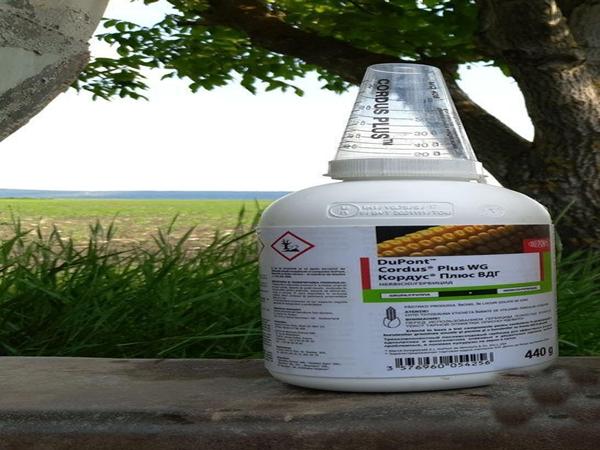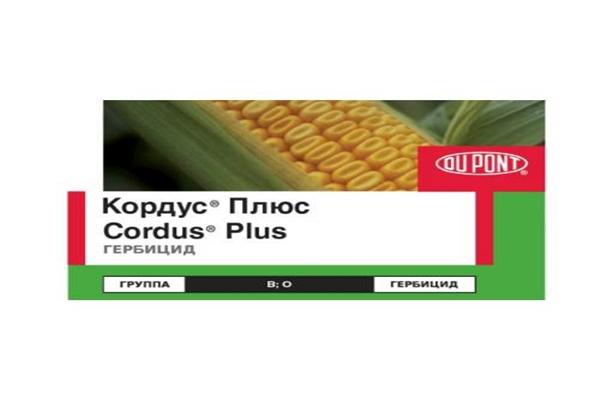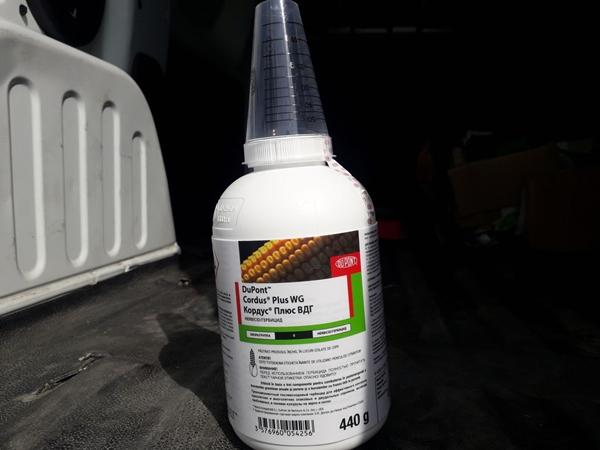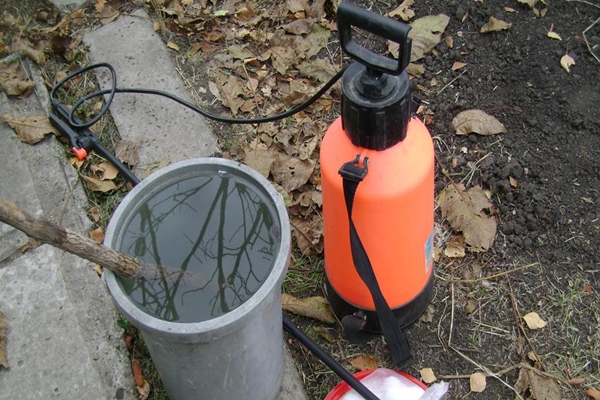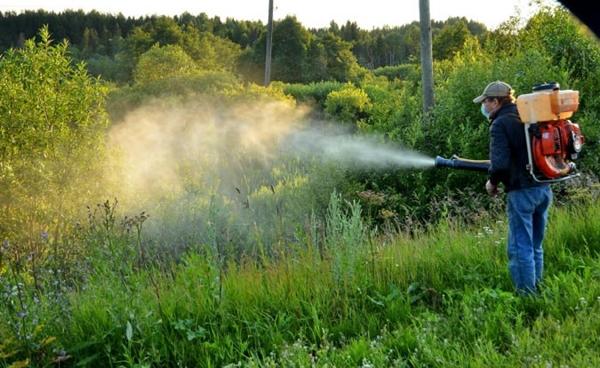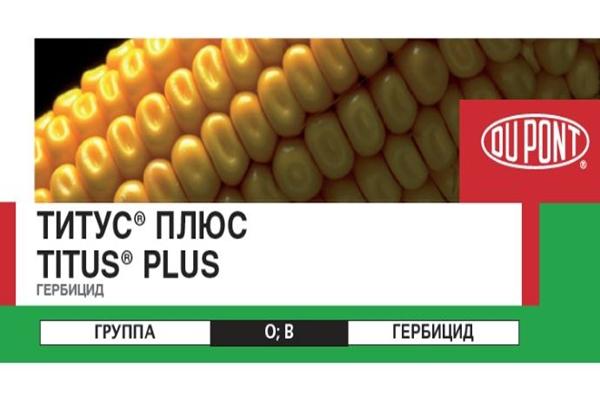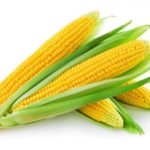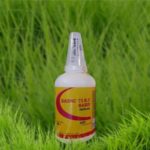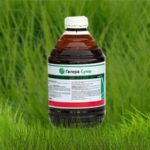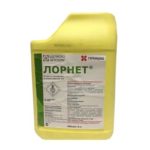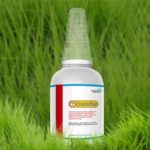Cordus Plus is a post-emergence herbicide with systemic and selective activity. Used to control all weeds on corn crops. The drug has a three-component composition, quickly destroys weeds and has a long-lasting protective effect. Only one treatment is carried out per season. The herbicide is available in a convenient form as water-soluble granules.
- Composition, purpose and release form of the drug Cordus Plus
- Principle of operation
- Advantages and disadvantages
- Consumption rate
- How to properly prepare the working mixture
- How to use the ready-made solution
- Safety precautions for use
- Degree of herbicide toxicity
- Compatibility with other substances
- Storage periods and rules
- Similar means
Composition, purpose and release form of the drug Cordus Plus
The systemic selective herbicide Cordus Plus is produced under license from the American company DuPont at production facilities built in Russia.
This product contains three active substances: dicamba, nicosulfuron, rimsulfuron. A three-component herbicide is used to destroy all dicotyledonous and cereal weeds in corn crops.
The drug has the form of water-soluble granules. Sold in plastic jars weighing 440 grams. Before use, the herbicide is dissolved in water according to the instructions.
Corn crops are irrigated with an aqueous solution only once per season.
Cordus Plus destroys those weeds that have already sprouted. The sooner the treatment is carried out, the better the result. This drug has no effect on the corn itself.
Principle of operation
The herbicide is absorbed by the leaves and roots of weeds and spreads to all organs. 3-4 hours after treatment, cell division stops, the plant stops growing and begins to slowly wither. After 3-5 days, the first visible signs of the herbicide’s action appear - necrosis and chlorosis. The plant dies completely after 2-3 weeks. The herbicide does not affect the corn itself.
Advantages and disadvantages
Advantages of Cordus Plus:
- acts quickly and lastingly;
- has systemic and selective activity;
- does not require other herbicides for complex treatment;
- destroys all weeds;
- there is no need for restrictions on crop rotation;
- resistance has not been identified.
Minuses:
- prohibited for use in fields with sweet and popping corn;
- effective only in warm weather; activity slows down on cool days.
Consumption rate
A solution is prepared from water and herbicide.The consumption of working fluid is 200-300 l/ha. The product is used to spray emerging weeds on corn crops. Consumption rate - 22-44 g/ha. For moderate or weak vegetation, the minimum dosage is used. If there are a lot of weeds, the solution is made more concentrated.
Spraying a corn field is carried out only once per season.
How to properly prepare the working mixture
The herbicidal solution for irrigation is prepared in the dosages specified in the instructions. Fine-dispersive sprayers are used to spray the field. First, prepare a matrix solution. Measure out the required amount of the drug and dissolve it in water in a small plastic container.
Then the sprayer tank is half filled with water. Then the stirrer is turned on and the matrix solution is poured in. After which the mixer is stopped, the required amount of water is added and the mixture is mixed again. The working solution is prepared on the day of irrigation. The remainder of the mixture is not stored, but poured outside the agricultural land.
How to use the ready-made solution
The drug Cordus Plus can be used for corn, which is used for grain, oil or green mass. The herbicide destroys annual dicotyledons in the phase of 1-4 leaves, as well as young rosettes of perennial dicotyledons and wheatgrass (10-15 centimeters high). The corn itself should have 2-6 leaves.
The herbicidal agent must be used with Trend surfactant (200 ml/ha), which improves wetting of weeds with the solution and increases herbicidal activity.
It is not recommended to treat weeds that are wet from dew or rain with the herbicide Cordus Plus, that are under stress due to drought, temperature changes, poor nutrition, diseases or insects.The night before irrigation, the temperature should not fall below 10 degrees Celsius. You cannot spray fields if the daytime temperature rises above 25 degrees Celsius. After treating the field with herbicide, inter-row cultivation can be carried out only after 1-2 weeks.
Safety precautions for use
When working with herbicide solution, safety precautions must be observed. The person processing the field must wear a protective suit, mask or respirator, rubber boots and gloves. Do not inhale vapors or drink the solution. After field work, you need to wash your hands and face with warm water and soap, and rinse your mouth with a soda solution.
Degree of herbicide toxicity
Cordus Plus belongs to the 3rd degree of toxicity. The drug is harmless to humans and animals, does not harm birds and beneficial insects. It is not recommended to treat corn fields with this herbicide during the active summer of bees or near bodies of water in which fish are raised.
Compatibility with other substances
It is prohibited to use in mixtures with organophosphate insecticides. The herbicide cannot be mixed with fertilizers for foliar treatment. Can be used with other herbicides, as well as fungicides and insecticides. Before carrying out treatment, all chemicals must be checked for compatibility.
Storage periods and rules
The herbicide Cordus Plus can be stored in tightly closed original packaging for 3 years after the date of manufacture. Usually the expiration date is indicated on the label. The jar must be kept in a special warehouse designed for storing pesticides. The optimal storage temperature is 10-20 degrees Celsius.The drug is stored in a room protected from moisture and sunlight.
Similar means
An analogue of the herbicide Cordus Plus is the drug Cordus. It has the same manufacturer and the same three-component chemical composition. Both of these drugs are used to destroy all weeds that take away water and nutrients from the main crop - corn.

